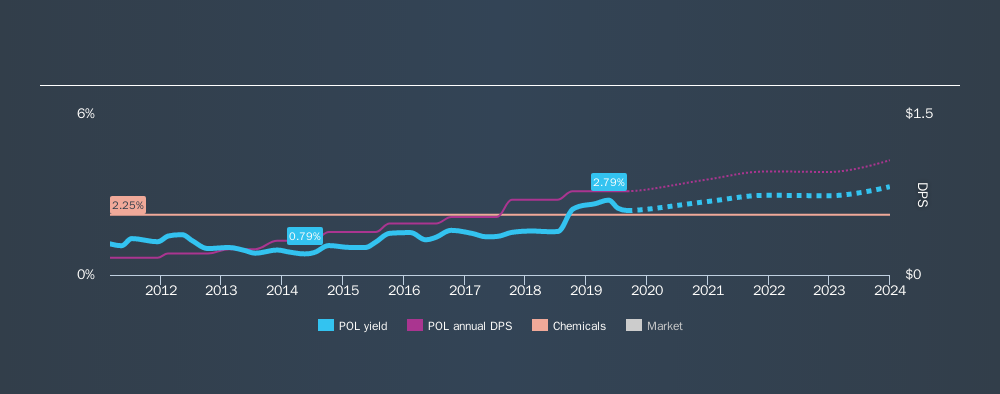- United States
- /
- Chemicals
- /
- NYSE:AVNT
PolyOne Corporation (NYSE:POL) Passed Our Checks, And It's About To Pay A 0.6% Dividend

Some investors rely on dividends for growing their wealth, and if you're one of those dividend sleuths, you might be intrigued to know that PolyOne Corporation (NYSE:POL) is about to go ex-dividend in just 4 days. If you purchase the stock on or after the 12th of September, you won't be eligible to receive this dividend, when it is paid on the 4th of October.
PolyOne's upcoming dividend is US$0.20 a share, following on from the last 12 months, when the company distributed a total of US$0.78 per share to shareholders. Based on the last year's worth of payments, PolyOne has a trailing yield of 2.4% on the current stock price of $32.5. Dividends are a major contributor to investment returns for long term holders, but only if the dividend continues to be paid. That's why we should always check whether the dividend payments appear sustainable, and if the company is growing.
View our latest analysis for PolyOne
Dividends are typically paid out of company income, so if a company pays out more than it earned, its dividend is usually at a higher risk of being cut. PolyOne paid out a comfortable 42% of its profit last year. Yet cash flows are even more important than profits for assessing a dividend, so we need to see if the company generated enough cash to pay its distribution. It distributed 34% of its free cash flow as dividends, a comfortable payout level for most companies.
It's encouraging to see that the dividend is covered by both profit and cash flow. This generally suggests the dividend is sustainable, as long as earnings don't drop precipitously.
Click here to see the company's payout ratio, plus analyst estimates of its future dividends.

Have Earnings And Dividends Been Growing?
Businesses with strong growth prospects usually make the best dividend payers, because it's easier to grow dividends when earnings per share are improving. If earnings fall far enough, the company could be forced to cut its dividend. For this reason, we're glad to see PolyOne's earnings per share have risen 13% per annum over the last five years. The company has managed to grow earnings at a rapid rate, while reinvesting most of the profits within the business. Fast-growing businesses that are reinvesting heavily are enticing from a dividend perspective, especially since they can often increase the payout ratio later.
Many investors will assess a company's dividend performance by evaluating how much the dividend payments have changed over time. In the past nine years, PolyOne has increased its dividend at approximately 19% a year on average. It's great to see earnings per share growing rapidly over several years, and dividends per share growing right along with it.
The Bottom Line
Is PolyOne worth buying for its dividend? PolyOne has been growing earnings at a rapid rate, and has a conservatively low payout ratio, implying that it is reinvesting heavily in its business; a sterling combination. It's a promising combination that should mark this company worthy of closer attention.
Curious what other investors think of PolyOne? See what analysts are forecasting, with this visualisation of its historical and future estimated earnings and cash flow.
If you're in the market for dividend stocks, we recommend checking our list of top dividend stocks with a greater than 2% yield and an upcoming dividend.
We aim to bring you long-term focused research analysis driven by fundamental data. Note that our analysis may not factor in the latest price-sensitive company announcements or qualitative material.
If you spot an error that warrants correction, please contact the editor at editorial-team@simplywallst.com. This article by Simply Wall St is general in nature. It does not constitute a recommendation to buy or sell any stock, and does not take account of your objectives, or your financial situation. Simply Wall St has no position in the stocks mentioned. Thank you for reading.
About NYSE:AVNT
Avient
Operates as a formulator of material solutions in the United States, Canada, Mexico, Europe, South America, and Asia.
Good value average dividend payer.
Similar Companies
Market Insights
Community Narratives



